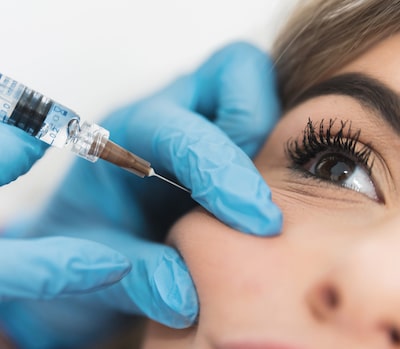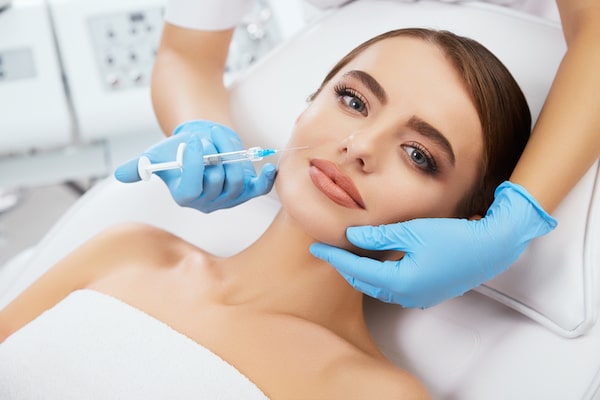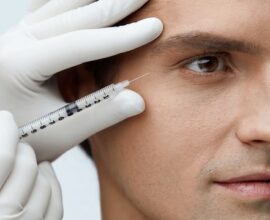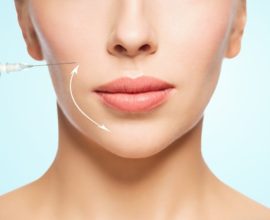Facial Fillers & COVID-19 – Cause for Concern?
This past December, the Moderna COVID-19 vaccine began seeing widespread distribution after receiving approval from the FDA. As society seems to be pushing forward in its efforts of slowing down the coronavirus, there has been some cause for concern. It has been reported that there have been some side effects from the vaccine and this has proven to be especially true for people that have had a history of receiving facial fillers. As vaccine data continue to pour in, a review conducted by the FDA advisory committee has found that patients with cosmetic facial fillers had mild reactions to the vaccine and this has particularly been the case after their second dose of the Moderna vaccine.
Facial Fillers and COVID-19 Vaccine Concerns
 As the number of patients who receive facial fillers continues to climb, a potential reaction to the vaccine can be concerning to those patients with existing fillers or to those who are considering facial fillers. Per reports in 3 patients with a history of cosmetic fillers, mild facial swelling was reported as a reaction of the vaccine. For two of these patients, the reaction occurred on the day of their vaccination. In the case of the remaining patient, it happened two days after the person was vaccinated. It also should be noted that filler injection was administered two weeks before the vaccine in one patient and six months previously in another. For one patient who had lip filler, that person had focal lip swelling and actually reported a similar reaction in the lips in the past after receiving a flu shot. What makes this an isolated observation regarding the Moderna vaccine, those that received the Pfizer vaccine and fillers have not been reported as having to deal with these side effects.
As the number of patients who receive facial fillers continues to climb, a potential reaction to the vaccine can be concerning to those patients with existing fillers or to those who are considering facial fillers. Per reports in 3 patients with a history of cosmetic fillers, mild facial swelling was reported as a reaction of the vaccine. For two of these patients, the reaction occurred on the day of their vaccination. In the case of the remaining patient, it happened two days after the person was vaccinated. It also should be noted that filler injection was administered two weeks before the vaccine in one patient and six months previously in another. For one patient who had lip filler, that person had focal lip swelling and actually reported a similar reaction in the lips in the past after receiving a flu shot. What makes this an isolated observation regarding the Moderna vaccine, those that received the Pfizer vaccine and fillers have not been reported as having to deal with these side effects.
Dr. Joel L. Cohen is an expert on filler treatments and serves as the director at AboutSkin Dermatology in Greenwood Village, Colorado. Regarding facial fillers and the COVID-19 vaccine, Dr. Cohen wanted to emphasize that, in the cases where reactions were reported, all of the reactions were mild, temporary and treated rather quickly with common options such as antihistamines or steroids. Most importantly, these reports were not unique to the COVID-19 vaccine. According to Dr. Cohen, the swelling could be a “delayed inflammatory response” caused by the immune system “revving up” after the vaccine. This has been seen in patients dealing with upper respiratory infections, sinus infections; dental abscesses and even with other vaccines.
The American Society of Dermatologic Surgery (ASDS) suggests that these reactions can be caused by viral and bacterial illness, vaccinations such as the flu shot and dental procedures. According to the ASDS, patients with fillers shouldn’t be barred or precluded from receiving vaccines. This also goes for patients that have received the vaccine and want to get facial fillers. This was also repeated by Dr. Cohen who made reference to the few cases that displayed this reaction compared with the overall number of participants receiving the vaccine during this trial. The benefits of the vaccine far outweigh the risk for reactions from the vaccine.
Patient Reactions – How Long Did They Last
For the patients that did experience complications after receiving the vaccine, the reactions were temporary and resolved after receiving proper treatment. As stated before, reactions were cleared up with common treatment options and, according to Dr. Cohen, some were even resolved without treatment. If a person feel as if they have complications or reactions that need to be addressed, it is imperative that they do so with people trained to treat these issues. Dr. Cohen also stated that there hasn’t been any information released regarding fillers that participants received and some products may be more likely to cause the delayed swelling. Clinicians shouldn’t be able to direct patients away from products more likely to cause a reaction because there aren’t products that cause such events.
Dr. Cohen points out that specific details regarding the swelling were not made known such as if it was a general reaction, focal swelling and/or if it was red, warm or painful. Members of the ASDS will continue to evaluate and monitor these developments.
At the end of the day, patients that have received facial fillers shouldn’t be discouraged from receiving the COVID-19 vaccine. On the flip side, patients who have received the vaccine, or are planning to, should not be discouraged or kept away from pursuing future filler injections. The ASDS encourages its members to continue, and not halt, current practices with regards to dermal fillers. This includes obtaining an extensive medical history on all patients. According to Dr. Cohen, “As we know that vaccine-related immune reactions seem to be heightened after the second dose, or if you are concerned or have a history of facial filler reactions, then consider waiting about 2 weeks after your second dose.”
In the press release announcing the ASDS guidance, President Mathew Avram, MD, says “Patient safety is foremost in the practice of dermatology and board-certified dermatologists take adverse effects seriously. Although still very early in the vaccination process, this guidance is meant to be informational and helpful as we move forward during pandemic recovery efforts.”
– JM




